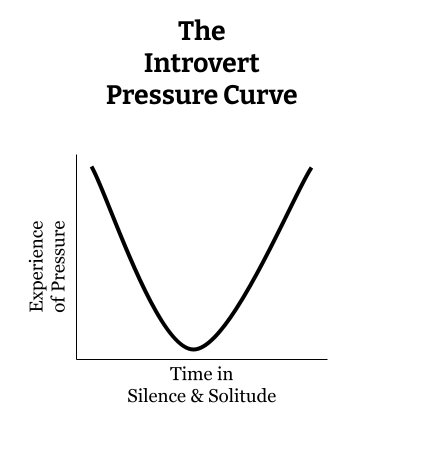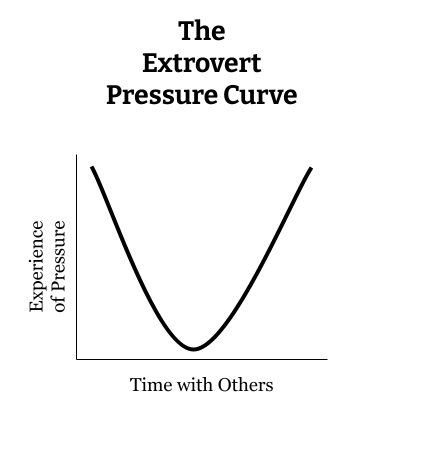I had this idea the other day when leading a workshop on teacher wellness for a network of schools in the Detroit area. The reason I'm sharing it here on the blog is that I'd like your take on whether or not it's accurate. And also, if you're experiencing lots of pressure in your soul right now, maybe this little thinking tool can help you identify a next step.
It seems to me that there are inverse pressure dynamics in the souls of introverts and extroverts based on how much time they spend in their energy-giving modes. For introverts, the energy-giving mode is solitude; for the extrovert, it's time with others. BUT, in my experience as an introvert, I do find that I can have too much time alone (e.g., when you add up my prep and my time after school, I can some days be alone for hours, and I can keep this up for many days in a row) and that it can create its own kind of pressure on my soul.
Graphically, this is what I'm talking about:

And so I got to wondering if there was a similar dynamic for extroverts — if they can have too much time with others.

These curves make sense to me given my experience as a soul and my work with others. Human souls have a hard time with too much of even good things; we need balance.
So:
- If you're an introvert and you're feeling lots of pressure in your soul, ask yourself: am I getting not enough time alone or too much of it? How might I move more toward balance?
- If you're an extrovert and you're feeling lots of pressure in your soul, ask yourself: am I getting not enough time with others, or too much of it? How might I move more toward balance?
Best to you, colleague,
DSJR
Zachary says
I’m fascinated by your reflection here, Dave!
I can speak directly to the first–the introvert side–in my own experience. I completely agree with your comments and find that it is abundantly clear to me when my degree of solitude becomes too much in large part because of the way I treat people. (Hint: it gets poorer when I am too isolated)
But for an extrovert? I’m curious! My wife (more extroverted than introverted) definitely would agree with you here–to the point that because so many people will generalize (“an extrovert gets energy from being with others!”), she often thinks that maybe she actually isn’t extroverted simply because she does find herself needing alone time now and then and almost feels guilty about it.
Ultimately, though, I will add another layer of consideration here: the nature of PURPOSE in that time (either solitude or social) also influences this curve. In fact, I personally believe that it influences these things so much that the natural inclination I feel for solitude can be completely overruled when the social interactions are of a certain nature, a certain Spiritually fulfilling nature in my own experience.
Always enjoy your rumination!
Gwynn says
Hi Dave,
Thanks for bringing this up. It’s been on my mind as well.
I, too, am an introvert. I am also a teacher, pedagogical leader, mother of 3, and wife, to name a few. I find that when I don’t get enough time in silence and solitude, I am not my best self in any of my roles, particularly with my family. As is the case with many folks, my stamina for relating with others doesn’t always last through my family time. Most often, the result of not enough alone time is a lack of patience.
However, I also know that I am also not my best self if I am alone too much, so I agree with your description. I’m also going to agree with Zachary (above). Another important consideration is the nature of purpose in the time spent either alone or with others. The curve would be influenced by the intention and perhaps we can say the quality of that time. For instance, spending time with a few loving friends can help me recharge, even though it is social time. My guess is that extroverts would find that quality alone time – intentional time – can help them recharge.
I look forward to seeing what others think about this idea!